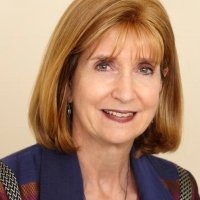The Haleh Esfandiari Forum: Advocating for Afghan Women’s Rights on the Global Stage with Amb. Paula J. Dobriansky, Ph.D.
Submit a question
The Wilson Center’s Middle East Program (MEP) hosted Ambassador Paula J. Dobriansky, Ph.D. Amb. Dobriansky spoke with MEP Director Merissa Khurma about the dire state of women’s rights in Afghanistan, the role of the United States, other states in the region, and the international community in upholding a rights-based order, and the powerful role of women’s leadership in peace, stability, and prosperity.
This discussion is part of the Haleh Esfandiari Forum, an initiative by the Middle East Program, to honor Haleh Esfandiari’s, commitment to promoting women’s empowerment and her leadership of MEP from its inception in 1998 through 2015.
State of Afghanistan
Amb. Dobriansky opened the conversation by stating that that two years after the Taliban took control over Afghanistan, they have implemented a regime of gender apartheid through increasingly draconian measures that restrict women’s freedoms, rights, and access to education, healthcare, and work. Most recently, the Taliban have stepped-up arbitrary arrest and detention and abuse of Afghan women. Amb. Dobriansky stressed that not only is women’s lack of participation in society bad for the health of a society and economic growth, but it also flies against what the Taliban had proclaimed two years(ago?) about being more open and integrating women into their society more.
Critical work of NGOs
Amb. Dobriansky reflected on her work with the U.S.-Afghan Women’s Council. She emphasized how Afghan women themselves steered the focus of the organization to education, healthcare, entrepreneurship, and civil society, governance and rule of law. “Women wanted to have a stake in the future and in decision-making in Afghanistan,” said Amb. Dobriansky. She highlighted the non-profit organizations currently working in the country like Made By Afghan Women, Kandahar Treasure, Sakena’s Foundation, Afghan Institute of Learning, the Nooristan Foundation, Enlighten a Mind, Lamia Afghan Foundation, the Eagle Online Academy, Uplift Afghan Fund, the Aschiana Foundation, Turquoise Mountain, Bayat Foundation, Friends of the American University of Afghanistan, Relief International, the Georgetown Institute for Women, Peace, and Security, Women for Afghan Women, and the Bush Center’s Afghan-Iranian Women’s Council, among others. Amb. Dobriansky emphasized that work both inside and outside government is critical and must be coupled with media attention. “This [issue] has been on the backburner and this deserves to be front and center.”
Role of the international community
When asked if the U.S. should engage with the Taliban as a way to talk to the more moderate factions or influence policies that target women and girls, Amb. Dobriansky stood firmly against engaging. She stated that normalization will not lead to results; U.S. officials have been working to engage but there has been only regression.
While the U.S. has a vital role in keeping programs running through the Offices of the Ambassador, Global Women’s Affairs, and Special Representative, Amb. Dobriansky spoke on the critical role of Muslim-majority countries. She recounted when Abdullah Abdullah, the former foreign minister of Afghanistan, asked how to advocate for a Wilson Center monograph on the compatibility of democracy and Sharia Law, he was told translate the monograph into Dari and Pashto. Amb. Dobriansky emphasized how countries in MENA have the knowledge and an authentic voice in this conversation.
The American University of Afghanistan
Amb. Dobriansky reflected on her work establishing the American University of Afghanistan and recounted a conversation with a young woman at the university who stated that she chose to attend, despite the financial cost, because she valued freedom of her own mind. After the Taliban takeover in August 2021, Qatar acted quickly in bringing students to Education City, where they also had the opportunity to matriculate at other universities. On a smaller-scale, women are starting their own WhatsApp groups to transfer knowledge to one another. As part of a network, where women feel seen and grow.
Women in Diplomacy & Policy
Merissa Khurma, the director of the Middle East Program ended the conversation by asking Amb. Dobriansky if she had advice for young women seeking a career in diplomacy or foreign policy; to which Amb. Dobriansky replied that they should first, get involved in what they enjoy and are passionate about and then not be deterred by the barriers or obstacles they face. Amb. Dobriansky emphasized how important it is for women to speak up and hopes that there is a comradery where women support one another.
The forum underscored the importance of a comprehensive approach to advocating for Afghan women that brings together grassroots activism with international programs that ensuring that the plight of Afghan women remains a priority on the global agenda. “[The] comradery of spirit that will last and overtake the current crisis that has overtaken Afghanistan,” said Amb. Dobriansky.
Speaker

Senior Fellow, Harvard University Belfer Center; former Under Secretary of State for Global Affairs; Founder and Co-Chair of the US Afghan Women's Council
Introduction

Moderator

Hosted By

Middle East Program
The Wilson Center’s Middle East Program serves as a crucial resource for the policymaking community and beyond, providing analyses and research that helps inform US foreign policymaking, stimulates public debate, and expands knowledge about issues in the wider Middle East and North Africa (MENA) region. Read more


Middle East Women's Initiative
The Middle East Women's Initiative (MEWI) promotes the empowerment of women in the region through an open and inclusive dialogue with women leaders from the Middle East and continuous research. Read more


Indo-Pacific Program
The Indo-Pacific Program promotes policy debate and intellectual discussions on US interests in the Asia-Pacific as well as political, economic, security, and social issues relating to the world’s most populous and economically dynamic region. Read more
